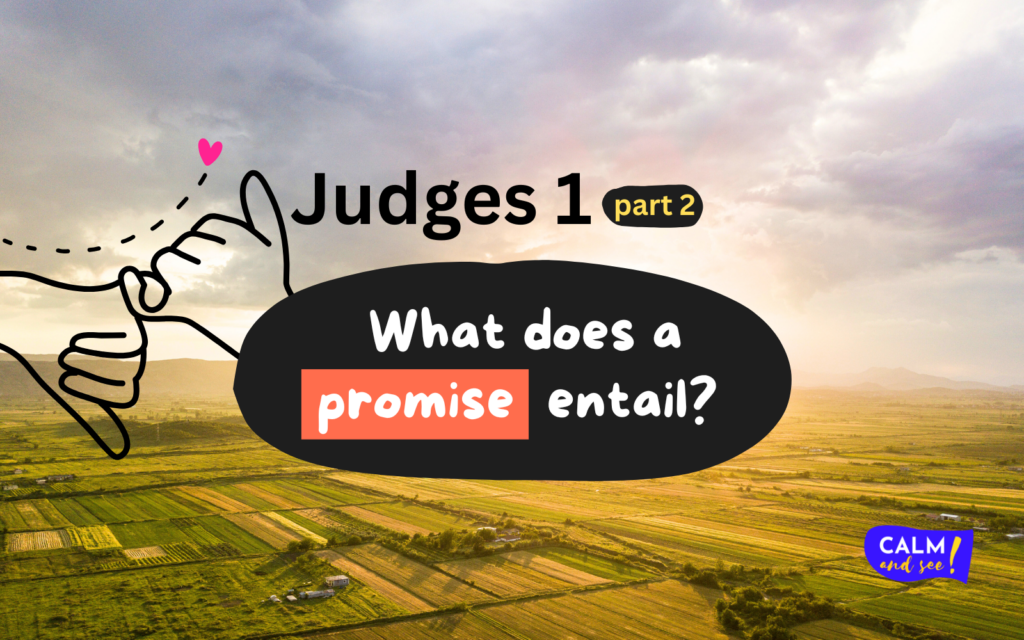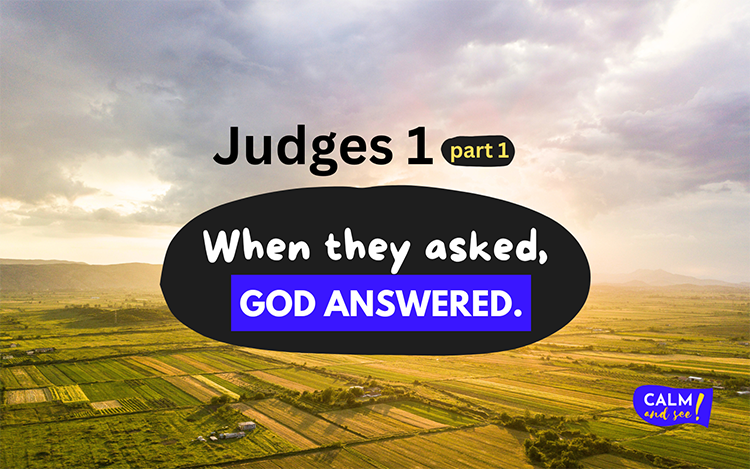
This isn’t a Bible study, I am not a teacher nor in clergy — just my personal reflections and observations.
Today, we continue in the Book of Judges, Chapter 1:1-2. The previous post provided some context on the various names and people mentioned. But this post focuses on some details and personal observations. Let’s read verses 1 to 7 together to see the bigger picture.
“1 After the death of Joshua, the people of Israel inquired of the Lord, “Who shall go up first for us against the Canaanites, to fight against them?”
2 The Lord said, “Judah shall go up; behold, I have given the land into his hand.”
3 And Judah said to Simeon his brother, “Come up with me into the territory allotted to me, that we may fight against the Canaanites. And I likewise will go with you into the territory allotted to you.” So Simeon went with him.
4 Then Judah went up and the Lord gave the Canaanites and the Perizzites into their hand, and they defeated 10,000 of them at Bezek.
5 They found Adoni-bezek at Bezek and fought against him and defeated the Canaanites and the Perizzites.
6 Adoni-bezek fled, but they pursued him and caught him and cut off his thumbs and his big toes.
7 And Adoni-bezek said, “Seventy kings with their thumbs and their big toes cut off used to pick up scraps under my table. As I have done, so God has repaid me.” And they brought him to Jerusalem, and he died there.”
Judges 1:1-7
Verse 1: What are the people of Israel asking, and why?
Generations earlier, God promised the land of Canaan to Abraham and his descendants—the people of Israel. Under Joshua’s leadership, they had begun to enter the land and fight for it. The Promised Land wasn’t given to them all at once—it was divided among the tribes only after several early victories. But even then, the conquest wasn’t complete. Much of the allotted land remained occupied by the original inhabitants of the land – the Canaanite nations which included the Canaanites, Hittites, Amorites, Perizzites, Hivites, Jebusites and the Gigashites (revealed by God through Moses in Deuteronomy 7:1).
Since there was no successor to Joshua – no central leader over all the tribes, the Israelites turned to God for direction. They ask, “Who shall go up first for us against the Canaanites?” In other words, which tribe should begin the next phase of claiming what God has promised?
Observation: I was encouraged that without a central leader, the Israelites turned to God for direction instead of taking matters into their own hands, or deciding the next steps among themselves without asking God.
God responds and responds clearly: Judah shall go up. Not only that, He assures them, “I have given the land into his hand.”
Before a single sword is lifted, God has already declared the outcome. Victory is promised. But the promise still requires a response—The tribe of Judah must fight the battle in faith and confidence in God.
In order for (the tribe of) Judah to act in faith, Judah must first have to believe.
(Side read: A biblical example of what we can do when we simply can’t believe in God or His promises)
Reflection #1: God’s Sovereignty and Human Responsibility
This passage helped me better understand what it means to walk with the God of the Bible. There’s a phrase that captures what I observed here: “God’s sovereignty and human responsibility.” God is the one who brings about the victory, but His people must step into the promise and claim it through faith and obedience.
In these verses, the people of Israel seek God for guidance. God responds clearly and even reveals the outcome He Himself will bring about. But nothing will happen unless the tribe of Judah responds in faith and obedience. That obedience—going into battle against the Canaanites—requires courage and faith.
This is a powerful example of how God works. He tells (the tribe of) Judah to go and claim their promised land. He declares victory in advance—because He’s the one who will make it happen. Yet Judah still has to act.
If they had done nothing, they wouldn’t have received what was promised. To claim the promise, they had to take a bold step forward and engage in battle. It was a leap of faith—because battle is risky—but it was necessary for God’s promise to be fulfilled through them.
What are some examples of responding in faith?
I’m grateful the Bible doesn’t leave us guessing—Hebrews Chapter 11 in the New Testament gives us some examples of people who responded to God with faith. Want to explore it for yourself? Click here to read it!
The Bible is full of God’s promises:
- Some were made to specific people in particular situations (like in Judges 1), so we can’t claim them for ourselves — but we can learn from them.
- Others are promises made to us, and those we can claim with confidence.
Are you aware of all the promises in the Bible? Do you know which promises are for others? Which promises are for you? I know some—and I’m on a journey to discover more. I welcome you to join me on this lifelong journey of reading the Bible for yourself!
There’s still more to unpack in these 7 verses.
…to be continued…
(click to read first post on Judges)
(click to read previous post)



